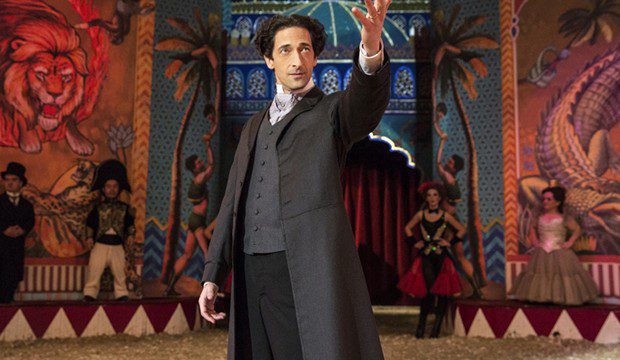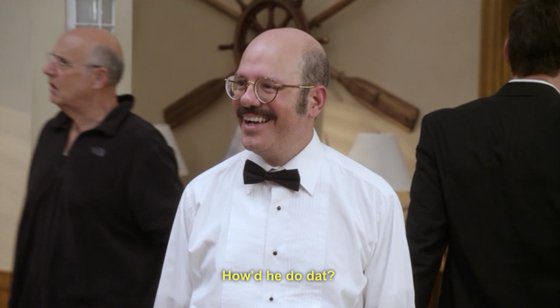The second part of Houdini faces a problem right off the bat: it feels like a “part two,” not a second half. It literally picks up before we left off, showing us Houdini’s jump into the frozen river again. I think this sequence – and the whole miniseries, really – would have played better if it were structured more like a film, and we really don’t need to see a repeat of something we saw twenty-four hours ago. Houdini is still stuck with overbearing voiceover, too, and it gets even more obvious in the second installment, as Adrien Brody explains to the audience what a straight jacket is. Um, everyone already knows what that is, buddy.
“Part Two” is lighter on escapes and espionage than “Part One” was, and as a result it often feels scattered and rushed. After an argument with Bess, Houdini agrees to stop doing escapes and turn his attention back to more traditional magic. In Europe once more, he makes an elephant disappear (once again, the magic scenes in Houdini are thrilling and well-executed); he also walks through a wall, which earns him the admiration of Sir Arthur Conan Doyle and his wife, both spiritualists. Conan Doyle sincerely believes that Houdini has supernatural powers, making him perhaps the biggest Howdeedodat in history.
While in Europe, Houdini’s mother dies, and this is as good a time as any to talk about the weird Oedipal relationship the film portrays. I don’t know how much of what’s shown is true to life, but it’s unsettling for many reasons. When Houdini is trapped under the ice of the frozen river, it’s his mother voice he images calling him, not his wife’s. When he leaves for Europe, she kisses him fully on the mouth; and when he is dying in a hospital (spoiler?), he sees the nurse with his mother’s features…who then kisses him on the mouth. It’s weird and distracting.
A lot of Houdini’s later years get glossed over. Namely his time spent making silent shorts in 1922, which we only see a glimpse of. Houdini is much more interested in showing his war against false mediums and mystics, which admittedly is an interesting topic. After Lady Doyle claims to have contacted his mother, he denounces her as a fake; when another medium who goes by the name Margery claims the same, he denounces her as well. In fact, Brody says “fake” so many times here that it’s almost as though the script were written by Holden Caulfield.
If the History Channel had had more time – say, six hours instead of three and a half – I don’t doubt that it could have produced a powerful, engrossing biopic about a man who remains shrouded in mystery to this day. Brody is fully committed to the role; would that he had a better vehicle to showcase his talents.
Houdini is by no means bad; if anything it plays as a missed opportunity, a sadly unsuccessful marriage between a talented actor and a role he’s clearly passionate about. There’s just something…missing here, and I’m not sure if the fault lies with Uli Edel’s direction, Nicholas Meyer’s script, or some combination of both. Houdini should have jettisoned John Debney’s distracting score as well. Overall, I enjoyed the film, sometimes quite a bit, but more often than not it felt like a blueprint for something greater. After all, Houdini billed himself as “Great,” and that’s the kind of treatment he deserves. Brody too, for that matter.
“Part Two” Score: 3 Stars
Miniseries Score: 3 1/2 Stars


